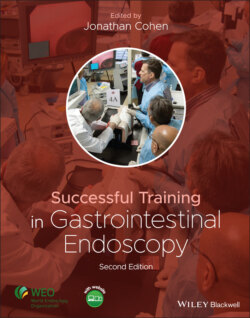Читать книгу Successful Training in Gastrointestinal Endoscopy - Группа авторов - Страница 87
Administration of moderate sedation
ОглавлениеIn addition to understanding the appropriate indications for upper endoscopy, another important cognitive aspect of EGD training is the administration of moderate sedation. Studies have demonstrated that the administration of moderate sedation increases the probability of a successful examination, patient satisfaction, and willingness to repeat the examination [7]. It is also important to train fellows that some patients may be able to undergo an EGD without the administration of conscious sedation and with topical anesthesia only. Patients who request to undergo endoscopy without sedation should be advised regarding symptoms that they might experience during the procedure. They should be provided with the opportunity to undergo a sedated procedure if they are unable to tolerate endoscopy without sedation. Prior studies have indicated that only a minority of patients in the United States would be willing to undergo an EGD without sedation [8]. Transnasal endoscopy without sedation has been shown to be acceptable to patients who are offered this examination and equally effective for screening and surveillance of Barrett's esophagus (BE) [9].
Figure 5.1 White light high‐resolution endoscopy (HRE) image of (a) early erosive esophagitis (Mayo Clinic, Jacksonville, USA) and (b) Los Angeles Grade D reflux esophagitis (University of Utah Health Sciences Center, Salt Lake City, USA).
(Contributed with permission from Advanced Digestive Endoscopy: Comprehensive Atlas of High‐Resolution Endoscopy and Narrowband Imaging. Edited by J. Cohen. Blackwell Publishing. 2007: p. 177.)
In some patients, routine administration of moderate sedation may not be effective. This includes patients who consume moderate to large amounts of alcohol and who use benzodiazepines and/or narcotics. These patients should be advised that the administration of conscious sedation might not produce significant sedative effects. In such cases, utilization of propofol or general anesthesia may be required and has been shown to be associated with a higher probability of a complete examination [10].
